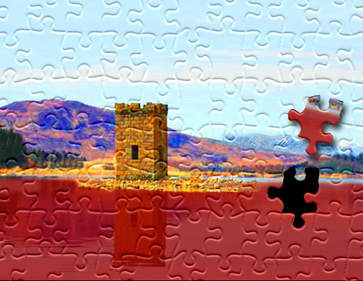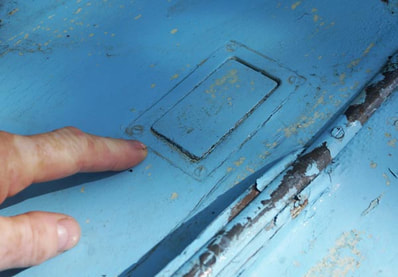Plunging waterline by Graham Higson
August 1973 and daylight reflected on the water's surface like a shimmering desert oasis, beckoning, calling. This was Loch Rannoch in the Scottish Highlands, and for a moment it seemed like paradise – if only we'd not been staying in a caravan. And nearby, similarly cramped in a tent with her parents, was a girl almost my age. She was lovely, with short, blonde hair stylishly curved against the nape of her neck. If only we could spend some time together…
"See that little grey speck over there?" I asked her. "You have to really squint. It's a tiny island with a lift shaft on it." Just my sense of humour.
Dawn laughed and I offered to take her out there in our dinghy. I had a morbid fascination with depths, and the loch was over 400 feet deep, but right then whatever lay far beneath was the last thing on my mind. I reckoned it would take an hour to reach there, so we should be back well before dark.
The boat was a 10-footer, made from cedar and marine ply, and with integral buoyancy tanks. Sitting on the thwart, the water sloshing up the redundant centreboard slot, I rowed diagonally towards the mysterious little island that, after twenty minutes, was still only a speck in the distance. Dawn directed me, keeping us on course. By this time, strong currents seemed determined to pull us back, but no way was I going to suggest giving in and turning around. I remember the shlapping noises against the hull, amplified by the tanks. That still gives me the shivers.
"What happens if we sink?" she asked, out of the blue.
"Then we swim for it."
She hesitated. "I'm not a good swimmer."
Back home I'd earned Royal Life Saving Society awards that showed I could tow another person for long distances … but that was in a pool, not a freezing cold loch with unseen hazards.
"We can't sink, got buoyancy tanks," I assured her.
So what about lifejackets? I hear you ask. We had those, but even so, being dumped into cold water could so easily mean that hypothermia, not drowning, would be the cause of our demise. I rowed on, reflecting that, for the first time in my life, I was responsible for the safety and well-being of another person.
Sitting with my back to the direction of travel was the worst thing about the journey, and it was frustrating not knowing where the hell we were. I lost so much momentum if I paused to look around, so I just kept on going. Then –
"Bloody hell," she gasped. "See what you mean about a lift shaft!"
This was followed by a crunch, and a foreboding scraping noise. On either side rocks poked out of the water like tombstones, and at my feet the loch was fast flowing into the boat through a fist-sized hole in the hull. We had reached the island.
* * *
I don't think I've ever experienced such an empty feeling of despair. There were no mobile phones (I doubt there'd be a signal there even now, over 40 years later), and we didn't have a torch so we had no means of signalling for help. The island was made of rocks piled onto the loch floor, shallow at this point, and was maybe 20 yards across. And the lift-shaft was in fact a stone tower with battlements. Inside were empty crisp packets and spent condoms. Suddenly she grabbed my arm. Well, it was some sort of bodily contact, I suppose, but not exactly what I'd had in mind.
"It'll come dark soon. So how're you gonna get us back?"
"Could be tricky without a telephone box," I said, in a vain attempt to quell the panic I could see in her face, and felt deep within myself.
She stared at me with a mixture of loathing and trust, blaming me for holing the boat, but depending on me to somehow magic us back to shore.
* * *
It was hard-going, the water 9-inches deep inside the boat, the hull sitting dangerously low in the water, the choppy waves dumping in occasional bucket-loads over the gunwales for good measure. And Dawn, bless her, frantically using her platform shoes to bail it out, though it felt like a losing battle. Before setting back she had donated her socks to bung up the hole, but they hardly stemmed the inflow and within minutes were lost in the depths. And then the mist settled upon us.
I fought the currents and also the discomfort of sitting far down in a hostile environment that at times I felt certain was determined to gobble up the pair of us. Sailing on water is one thing; sitting in it, pulling on oars the same height as your ears, was another. We'd started out by heading straight for the opposite side, intending to hug the shore back to camp so that, should we lose the bailing battle, we could wade to safety. Eventually, we scraped against rocks, so were on course, and went blindly on from there.
The relief at hearing my mother's muffled voice in the distance was tempered by my dread of the impending humiliation, the inevitable dressing-down from both sets of parents, and in front of the girl I'd meant to impress.
When we beached, I expected she would rush into the arms of her concerned mother, but instead she waited as my dad shook his head at the damage and said not to worry, he'd fit a stainless-steel self-bailer in its place. Then Dawn hugged me, kissed me, and that was the last I ever saw of her. The next morning all that was left was a rectangle of pale grass where their tent had been.
* * *
Now, so captivating was the atmosphere that, years later, I set part of a supernatural mystery novel on the island – known as a crannog. Oh, and the self-baling device is still working to this day.













